I am trying to make up for lost time here! I cannot believe nothing has been posted on the blog since July (apart from Sunday's offering). I had such good intentions of keeping it going, but my husband got ill again, and life has been hectic with his latest round of hospital appointments. Anyway, as I've said before, this week is The 1962 Club, organised by Simon at Stuck in a Book and Karen at Kaggsy’s Bookish Ramblings, so I'm doing my best to join in.
Agatha Christie has featured in many previous Clubs, and the current one is no exception. Usually I really enjoy her Miss Marple books, but I struggled a bit with The Mirror Crack'd from Side to Side, and am not sure why. There are some very good things in it, but I don't think it will become one of my favourites. Like many people, I watched the old BBC dramatisation, with the excellent Joan Hickson as Miss Marple, and the more recent ITV version with Julia McKenzie starring as the spinster sleuth, but I don't think I've read the novel before - if I have, I've completely forgotten it.
It's quite slow moving, there are some loose ends that don't lead anywhere, and are never explained, and there's a lot of domestic detail that doesn't add anything to the plot - I normally like domestic detail, especially in 'Golden Age' crime novels, but this time there was too much. And I always feel Christie never quite adjusted to life in the 1960s, and the novels she wrote during that period somehow seem a little less real than her earlier work.
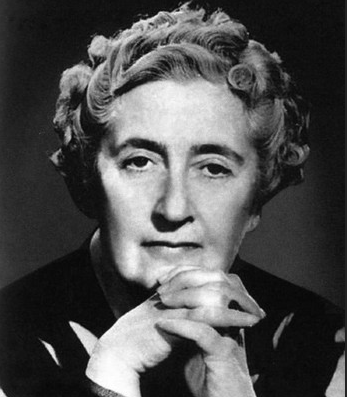 |
| Agatha Christie |
Anyway, The Mirror Crack'd from Side to Side centres on the death of Heather Badcock. organiser of the local St John Ambulance, who dies after drinking a poisoned cocktail at a fete held to raise money for the charity. Police assume the intended victim was American film star Marina Gregg, the new owner of Gossington Hall, where the fete is held - after all, who would want to murder Heather, a kindly woman who always wants to help people, even if her efforts are not always appreciated. Other deaths follow, along with mysterious telephone calls, death threat notes, and poisoned coffee. Is someone really trying to kill Marina? And if so, who? And why? Or, however unlikely, could Heather have been the target?
There are plenty of suspects, including Heather's downtrodden husband; Marina's current husband the film director Jason Rudd; a wealthy movie mogul who was spurned by Marina, and his film star wife who was once married to one of Marina's ex-husbands. Scotland Yard sends Chief Inspector Dermot Cradock to investigate, and he enlists the help of the redoubtable Miss Marple, who is already trying to unravel the mysterious goings-on at the Hall and the nearby film studios.
She is particularly interested in her friend Dolly Bantry's account of a meeting between Heather and Marina Gregg, and the odd expression on the film star's face, which reminds Dolly of Tennyson's The Lady of Shalott, which is referred to several times throughout the book:
 |
| John William Waterhouse's painting of The Lady of Shalott - I've included because I love it! |
The Lady of Shalott, for those who don't know the poem, could only look on the world through the reflection in her mirror, and the tapestry she was weaving - otherwise she will die. There are parallels, I think, with Marina Gregg, who is also unable to face reality, and whose life is shattered when a long hidden event from the past reppears. Dolly, a former owner of Gossington Hall, is much more astute than I remember her being in The Body in the Library, and offers some useful insights into Marina's character. She explains how the actress began to say all the usual things. "You know, sweet, unspoilt, natural, charming, the usual bag of tricks," she tells Miss Marple. Christie builds Marina's character bit by bit, seeing her through the eyes of staff, residents, her husband, people in the movie industry, and the police. She is insecure, craves love and affection, and adores being the centre of attention. She can be sweet and charming when it suits her, but suffers mood swings with dramatic highs and lows - I guess these days she would be described as bi-polar.
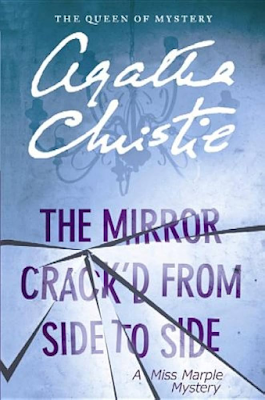



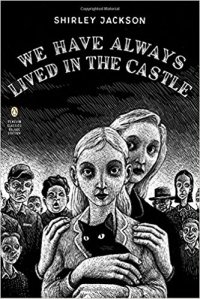 The girls clad themselves in table cloths and drapes (their clothes have been destroyed), and barricade themselves in the ruined house, while the villagers, ashamed of their actions, take to leaving gifts of food on the doorstep.
The girls clad themselves in table cloths and drapes (their clothes have been destroyed), and barricade themselves in the ruined house, while the villagers, ashamed of their actions, take to leaving gifts of food on the doorstep.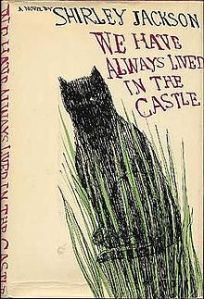 This all sounds very dark and chilling, and it is, but We Have Always Lived in the Castle also has one of the funniest scenes I have ever read in any novel. An old friend of the sisters’ dead mother comes to tea, accompanied by ‘little Mrs Wright’, whose avid curiosity about the murders overcomes her good manners – she can’t bring erself to drink tea or eat any of Constance’s cakes and sandwiches, but she takes a ghoulisjh interest in the details of the crime. And Uncle Julian rises to the occasion magnificently. He is a showman, displayimg his exhibits – the house, its inhabitants and their possessions - and he does it with outrageous charm, old-fashioned courtesy, and a wry sense of humour.
This all sounds very dark and chilling, and it is, but We Have Always Lived in the Castle also has one of the funniest scenes I have ever read in any novel. An old friend of the sisters’ dead mother comes to tea, accompanied by ‘little Mrs Wright’, whose avid curiosity about the murders overcomes her good manners – she can’t bring erself to drink tea or eat any of Constance’s cakes and sandwiches, but she takes a ghoulisjh interest in the details of the crime. And Uncle Julian rises to the occasion magnificently. He is a showman, displayimg his exhibits – the house, its inhabitants and their possessions - and he does it with outrageous charm, old-fashioned courtesy, and a wry sense of humour. 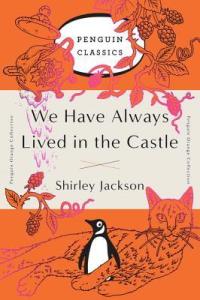 Amidst the horror and oddities everyday concerns loom large. Gardening, cooking, clothes are all important, as are good manners – at the end, despite everything that has happened, when villagers leave food Constance is concerned about what people would think of them if they sent the dish and cloth wrapping back dirty.
Amidst the horror and oddities everyday concerns loom large. Gardening, cooking, clothes are all important, as are good manners – at the end, despite everything that has happened, when villagers leave food Constance is concerned about what people would think of them if they sent the dish and cloth wrapping back dirty.
